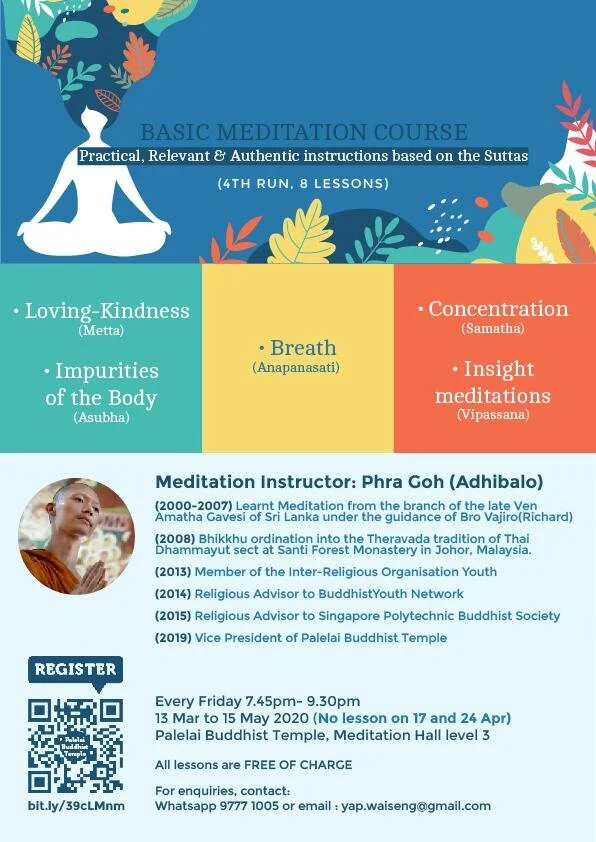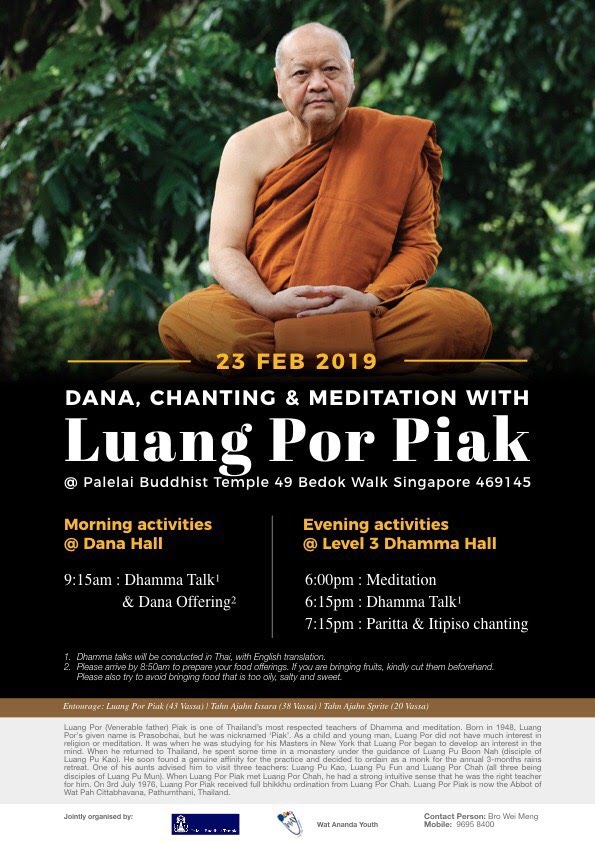Adjustments to Temple activities in response to COVID-19 outbreak
COVID-19 Precautionary Measures
Friday Meditation Class
Ajahn Dtun SG dhamma activities Jan 2020
Lunar New Year Celebration
Lunar New Year
Palelai Buddhist Temple will be celebrating Lunar New Year 2020 by welcoming the year of rat on Friday, 24th January 2020 at 11:00pm. The event organiser for this evening is Bro Yap Wai Seng.
Programme
24th January 2020 ( Friday Evening )
11:00 pm EO to light the candles and Pay homage to the Buddha
11:15 pm Paritta ( Protective Discourses ) Chanting
11:45 pm Dhamma Talk
12:00 am Blessings & Transference of Merits
12:20am Distribution of Huat Kueh and Mandarin Oranges
Note: The carpark at the temple compound will be closed from Friday, 24th Jan 2020 from 8:00 pm to Saturday, 25th Jan 2020 at 2.00 am.
2020 New Year Celebration
New Year Eve
Palelai Buddhist Temple will be holding a New Year Eve evening blessing session on Tuesday 31st December 2019.
Programme:
11:00 pm Lighting of candles and incense-sticks by EO Bro Kelvin Pung
Veneration of the Triple Gem
Requesting for the 3 Refuges & 5 Precepts
Requesting for Paritta Chanting
11:30 pm Paritta Chanting by the Sangha followed by Dhamma Talk
12:00 mn Midnight chanting welcoming the New Year.
Treasurer present token of appreciation to the Sangha.
Transference of Merits
Blessing by Phrakru
New Year Day
Wednesday, 1st Jan 2020
Programme:
09.00 am Pindapata (Alms Round)
09.30 am Lighting of candles & incense-sticks by EO Bro Kelvin Pung
Veneration of the Triple Gem.
Requesting for the 3 Refuges & 5 Precepts.
Requesting for Paritta Chanting.
09.40 am Paritta Chanting by the Sangha followed by Dhamma Talk
Treasurer present token of appreciation to the Sangha
Transference of Merits
Blessing by Phrakru
11.00 am Dana Offerings to the Sangha.
Ajahn Thanissaro dhamma talk recorded ( 2 & 3th Dec )
Luang Ta Siri dhamma activities ( 25 - 27th Dec )
Ajahn Thanissaro dana offering ( 24th Dec )
Recorded dhamma talk on 2&3th Dec19 link
Kathina 2019
Basic meditation course - Aug to Oct '19
Link to register: https://bit.ly/2O98S8K
Free Books to commemorate Vesak Day 2019
This Vesak Day we are very pleased to be able to publish 12 books for free distribution to our members and devotees. They range from introductory books on Buddhism and Buddhist practice to meditation instructions and autobiographies which we hope will motivate and encourage those who are more devoted towards the path of practice as taught by the Buddha. Here’s a brief introduction to each book we published for Vesak 2019:
1. The Bhikkhus’ Rules for Lay People
Most of us are not aware that Buddhist monks (Bhikkhus) of the Theravada school of Buddhism (which is the tradition that monks of Palelai Buddhist Temple are ordained into) adhere to 227 rules of conduct. There are cardinal rules which will disqualify them from living the life of a Bhikkhu and there are those rules which entail their having to undergo probationary re-training etc . On top of these there are rules pertaining to personal and communal conduct and good governance of the monastic community.
This book helps to explain the rules of conduct of Bhikkhus so as to allow lay Buddhists to better understand the training of Bhikkhus and thereby enable them to better support Bhikkhus in their practice of the Buddha’s path to awakening.
2. Keeping the Breath in Mind & Lessons in Samadhi – by Phra Ajaan Lee Dhammadharo (revised Dec. 15, 2018).
This is a fundamental guidebook for breath meditation and practicing the jhānas (deep states of meditative concentration). It is also Phra Ajaan Lee’s first written work.
Phra Ajaan Lee was the foremost amongst the students of one of the founders of the Thai Forest Meditation Tradition, Phra Ajaan Mun Bhuridatta Maha Thera, to bring the teachings of the Forest Meditation Tradition to urban Thai society. He was also the most prolific writer of meditation teachings amongst the students of Phra Ajaan Mun. The collected writings and talks of Phra Ajaan Lee is now available in two volumes entitled ‘The Teachings of Ajaan Lee volumes I & II’.
3. The Buddha’s Teachings - An Introduction
This is an introductory book on Buddhism written by Phra Ajaan Ṭhānissaro Bhikkhu. It contains a short introduction to the basic concepts and values underlying Buddhist practice, with special attention to clearing up common misinterpretations about what the Buddha taught.
4. Samana - Luangta Maha Boowa’s biography
The word “Samana” is a Pali (the Indian language in which the Theravada Buddhist texts are written) term meaning “contemplative” and is used to refer to someone who has undertaken to live the life of a Buddhist monk.
Luangta Maha Boowa (Phra Ajaan Maha Boowa) was a close disciple of Phra Ajaan Mun and was the flag bearer of the Thai Forest Meditation tradition. This book contains a biographical account (as related by him) of his early life and training with Phra Ajaan Mun. It also contains a number of his talks on various aspects of Buddhist practice, ranging from lay practice to training of the mind and attainment of awakening. This book serves as a very valuable guide practising Buddhists. Contains many coloured photos from his early age till his passing away.
5. First things First
This book is the seventh collection of essays on various topics on the Path of Buddhist Practice, written by Phra Ajaan Thanissaro Bhikkhu. The essays included are: Honest to Goodness, Did the Buddha Teach Free Will?, In the Eyes of the Wise, First Things First, The Karma of Now, The Streams of Emotions, Worlds & Their Cessation, Wisdom over Justice, All Winners, No Losers, How Pointy is One-pointedness?, The Limits of Description, and The Names for Nirvana.
6. Come and see
This is a compilation of three Dhamma talks by Phra Ajaan Funn Ācāro on the importance of being in touch with the truths inside—the truths of the body and of the mind—so that the mind can be trained to bring about happiness, both on the personal and on the social level. The talks were selected and translated from the Thai by Phra Ajaan Ṭhānissaro Bhikkhu.
Phra Ajaan Funn was one of the early students of Phra Ajaan Mun and was a teacher of the late King of Thailand, King Bhumibol.
7. The Forest Monks of the Rattanakosin Era
This book is an account of the life and practice of monks of the Thai Forest tradition founded by Phra Ajaan Sao and Phra Ajaan Mun. It gives the reader a glimpse of the way of life and values held by practising monks in the hopes of ensuring that monks of the current and future generations will have a good model of the what it means to undertake the life of a practising monk.
8. Biography of Mae Chee Kaew
This book contains the autobiography and some of the teachings of one of the most well known of the female disciples of Phra Ajaan Mun and Phra Ajaan Maha Boowa - Mae Chee Kaew. Although the tradition of fully ordained nuns (Bhikkhunis) was never established in Thailand, this life story of an eight precept female practitioner who followed the teachings of her masters to the fullest and who eventually attained awakening is truly very motivating and encouraging. It proves the point that one who is devoted to the practice of the Dhamma will still be able to attain awakening regardless of ordination status.
9. Biography of Mae Chee Kaew (in Chinese language)
10. Buddha Dhamma for students by Phra Ajaan Buddhadassa
This book is the result of two talks given by Phra Ajaan Buddhadasa in January 1966 to students at Thammasat University, Bangkok. Then and in the years since, many young Thais have been returning to Buddhism in search of answers and possibilities not provided by their modern (Western-style) education. In the face of rapid social change, at times bordering on chaos, they seek a non-violent approach to the issues and injustices of the times. Their interest is praised and yet recognized as needing guidance. Applying a confused or incorrect version of Buddhism to social confusion and conflict will not do any good. Thus Ajaan Buddhadasa always has tried to set both young and old straight as to what Buddhism really teaches. He does so by going back to the original principles pointed out by the Lord Buddha, explaining these simply and directly, and showing that their relevance is timeless. Truth is relevant and applicable in ancient India, contemporary Thailand, and even the overly developed West.
11. Non Violence
This book is a study guide of suttas (discourses) of the Buddha selected and translated from the Pali Language by Phra Ajaan Thanissaro Bhikkhu.
It contains passages from the Pāli Canon on the topic of putting an end to the causes of conflict and violence.
Topics covered in this guide includes the causes of violence and conflict, the practice of restraint, the benefits of non-violence, how to overcome violence on both the external and internal levels, overcoming anger, meditation training for fostering endurance, and the training to get to the root of violence & all conflict; in order to put them to an end.
Our world is now wrecked with violence and conflict and this study guide to Buddha’s teachings on the causes and solutions to overcome them is most timely and essential for a return to peace on earth.
12. Lay Buddhist Practice
A majority of devotees coming to our temple still lack a true and full understanding of what it means to be a practising Buddhist or to live the life of a Buddhist. This book is a very helpful practical manual for lay Buddhists covering devotional practices eg how to pay homage to images of the Buddha or to members of the Sangha (monks), how to set up a shrine room at home, the meanings of material offerings (flowers, light, etc.), how to observe the uposatha day (full moon; new moon etc days when lay Buddhists devote more time to practising the teachings of the Buddha), meanings of the five lay Buddhist precepts of practice, and basic meditation techniques.
This is an essential introductory book for all lay Buddhists who wish to practice the Buddhist way of life.
Vesak day 2019
Vesak day this year falls on 19 May 2019, Sunday, and it commemorates the Birth, Enlightenment and Maha Parinibbana (final passing away) of Lord Buddha. You, your family and friends, are invited to join us in celebrating this most sacred Buddhist observance day. Programmes start at 6 am.
PROGRAMME FOR VISAKHA PUJA (VESAK DAY)
6.00 am: Morning chanting, observance of five precepts
6.40 am: Breakfast dana to Sangha
7.30 am: All stations open
9.00 am: Pindapata - offering alms/requisites to the Sangha
9.30 am: Free vegetarian lunch for the public
10.45 am: Lunch dana to the Sangha
2.00 pm: Dhamma Talk (English)/ Dhamma Talk (Mandarin)
5.00 pm: All stations closed
6.00 pm: Evening chanting, candle light circumambulation, paritta chanting
Songkran (Thai New Year day 2019)
Songkran, traditionally a Thai New Year Day, is celebrated every year on the 13th April.
This year, Palelai Buddhist Temple will celebrate Songkran on Saturday, 13th April 2019. The Event Organiser for this event is Bro Kanya Yeo.
Devotees are welcomed to celebrate the pouring of dedication of water onto the Sangha's palm on this Thai New Year day.
The public water throwing among the devotees will be subject to a secluded area due to safety to all members and devotees.
The Resident Monks and Board of Management welcome you and your family to join us in the celebration.
13th April 2019 (Saturday)
06.00 am - Morning chanting
09.00 am - Bathing of Luang Phor Yok
11.00 am - Sangha's meal time
12pm to 3pm - Snacks will be provided for the public
1.30 pm - Matika chanting & transfer of merits, followed by pouring of dedication of water to the Sangha's palm
4.00 pm - End of Songkran event
6.00 pm - Evening chanting
Dhamma talk by Ajahn Kalyano on 17 Feb 2019 (Sun) 7:30 pm
Dhamma Talk by Luang Por Piak - 23rd February 2019
Ajahn Martin visit to Singapore
Ajahn Martin Visiting Singapore from 13 to 17 July 2018
2018 Rains Retreat (Vassa Programme)
Details of the programme during the 2018 Rains Retreat
Morning Meditation Session : 4.00 am - 5.45 am
Morning Chanting Session : 6.00 am
Temple Area Cleaning: 7.00 am - 8.00 am (followed by pindapat)
Morning Meditation Session : 4.00 am - 5.45 am
Morning Chanting Session : 6.00 am
Temple Area Cleaning: 7.00 am - 8.00 am (followed by pindapat)

















